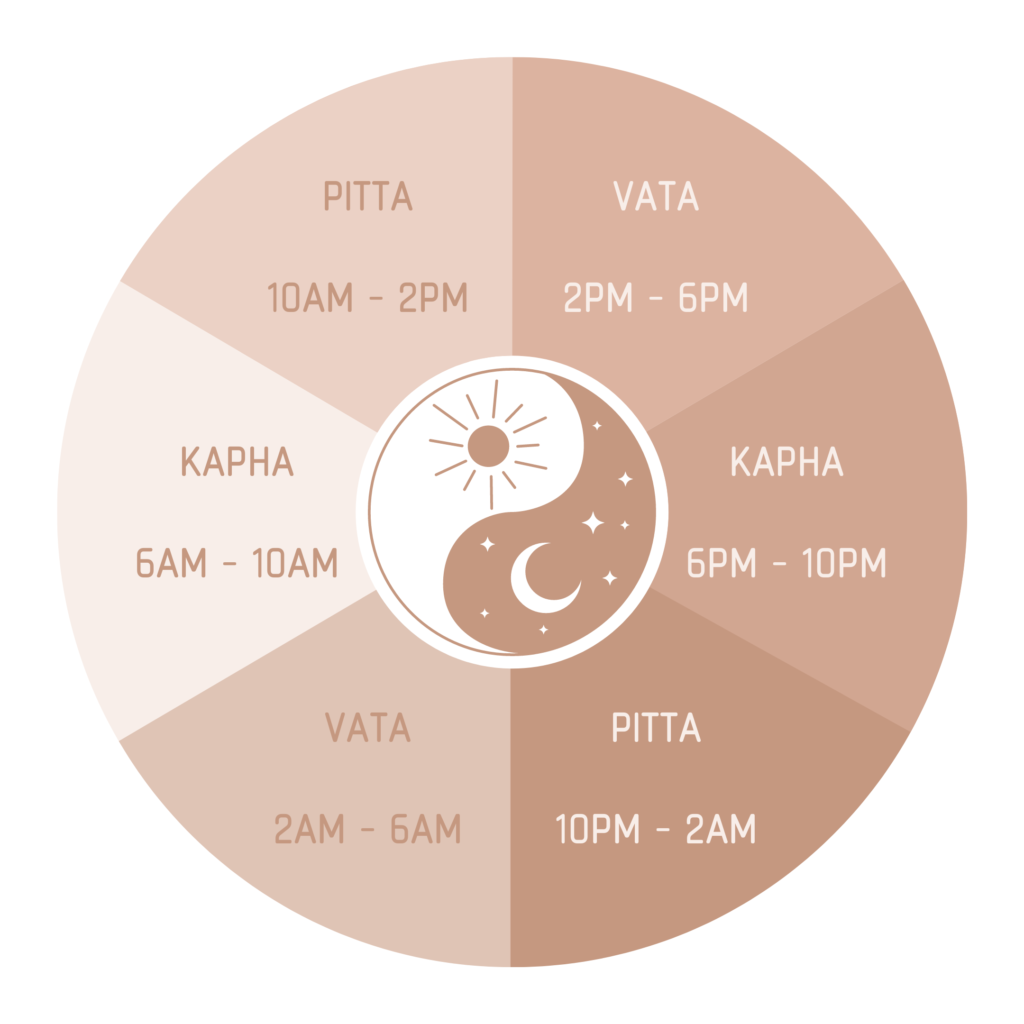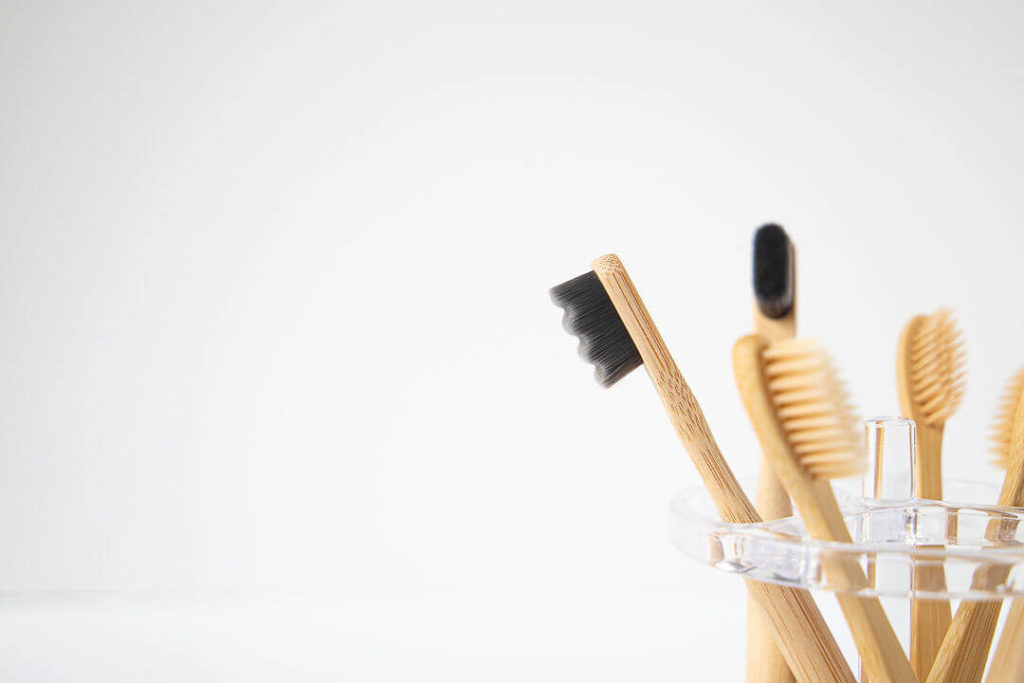Looking at the teachings of Ayurveda, we can find guidance on how to live our lives in harmony with nature. The term “dīnācārya” refers to a daily routine or set of activities. It comes from the words “dīnā”, meaning “day”, and “achārya”, meaning “activity.”

Ayurveda gives us the foundation of a balanced daily routine. It provides us with the knowledge of how our physiology is connected to the time of day and how the time we perform an action or activity can have significance.
Ayurveda is a mind and body healing practice of traditions and principles that originated in ancient India thousands of years ago. The doshas, or constitutions, are the three energies that govern a person’s wellbeing. These energies, or biological intelligence, exist in everyone at all times. If we look at nature, we can see the qualities and attributes of doshas expressed at different times of the day. Having a daily routine that is in sync with the natural world can help to improve your overall health and wellbeing. Our bodies are designed to follow specific rhythms, just as nature does. By aligning our activities with these natural cycles, we can function at our best.
The Ayurvedic Clock

The Kapha energy is most present between 6:00 am to 10:00 am and 6:00 pm to 10:00 pm. This is when there are more of the qualities of earth and water present: stability and cohesion.
Pitta time is between 10:00 am to 2:00 pm, and 10:00 pm to 2:00 am. We experience the qualities of fire and water during these times: transformation.
Vata time is between 2:00 am to 6:00 am and 2:00 pm to 6:00 pm, when qualities of air and ether; movement and space.
Morning Ritual
Morning is the Pitta time of day, so it’s important to wake up our bodies and get our energy flowing. The ideal morning routine for everyone includes practices that help us get our bodies moving and get our metabolism going for the rest of the day.

According to Ayurveda, it is best to rise with the sun. This allows for some flexibility when it comes to the seasons.
Begin your morning with a few moments of mindfulness.
Wash your face with cold water, brush your teeth and to ensure optimal oral health, be sure to include oil pulling and tongue cleaning in your daily routine. Swishing oil in your mouth helps cleanse the tongue and mouth while also promoting healthy digestion for the day.
A warming oil such as sesame oil for Vatas and Kaphas, and coconut oil for Pittas for its more cooling qualities.
Cleansing and clearing your nasal passages with a neti nasal rinse optimises your breathing for the day while also awakening your mind as the energy gets flowing in the head and neck.
Drinking warm water or tea in the morning can help stimulate your digestive system and promote healthy bowel function. For Vatas and Kaphas, adding lemon and ginger to the water can provide additional support for the digestive system.
Empty your bowels. To train your bowels to empty at this time, persistently go to the toilet each morning at the same time (even if you don’t have the urge to go).
Perform five to ten minutes of Abhyanga (self-massage).
If you wake up sluggish, adding some energising breathwork like Kapalabathi breath can help you feel more energised for the day. If the morning is when you wake up with a lot of energy, you can start by quieting your mind with some nice slow deep breathing.
Movement followed by meditation to awaken and clear the mind and a nourishing breakfast will give you the energy to start the day.
Afternoon Routine
Ayurveda also suggests we should eat our primary meal in mid-day when the fire of Pitta dominates. Pitta supports digestion and helps us process food, and this is applicable for all doshas. In fact, studies validate this practice, as this way, we most efficiently secrete acids and enzymes to digest our food more optimally.

Ayurveda recommends that lunch is enjoyed when the sun is at its highest. For those with Vata dosha, 11 am-12 pm is ideal, while Pitta dosha should enjoy lunch around 1 pm, and Kapha dosha should aim for lunch between 12 pm-1 pm.
To improve digestion, try to sit and eat a proper lunch without distractions. This means no reading books, working while eating, or talking on the phone. Once you have finished eating, relax for ten minutes (if you have time). To finish your lunch break, go for a short walk to assist the digestion process.
If you want to be productive, do your work during Pitta time! Your mind will be sharp and focused, so you’ll be able to get things done quickly. Once Vata time rolls around, take a few minutes to relax and reset. Slow deep breathing or a little stretching will help you stay calm and focused for the rest of the day.
As the afternoon progresses, Vata energy builds, and the body may feel the need to move. If your primary dosha is Vata, this is especially true. So go ahead and take a short walk! In addition, we may find ourselves to be most creative during this Vata time. As such, schedule some time during the afternoon for creative endeavours.
Ending your day with a calming meditation is the perfect way to de-stress from all the Pitta and Vata activities you’ve been up to. This will help your system wind down as you transition into the evening and prepare you for a restful night’s sleep.
Evening Routine
Getting enough quality, restorative rest is crucial for maintaining good health. Due to our non-stop lifestyles, it is important for all of us to have an evening routine that helps us to unwind and prepare for a restful night’s sleep. Ayurveda recommends specific times for the doshas to slow down and get ready for bed: Vata around 10 pm, Pitta between 10 pm and 11 pm, Kapha between 11 pm and 12 am.

Aim to eat your evening meal between 6 pm and 7 pm. Pay attention to the flavours and textures of your food, and savour every bite. Eat-in good company and with soothing music playing in the background if possible.
Be grateful for the nourishment your body is receiving, and take a leisurely walk afterwards to help encourage digestion.
Around two hours before going to bed, begin dimming the lights in your house. When the house lighting is dimmer, your body can naturally bring more melatonin into the brain, which will help you fall asleep faster.
If you’re looking at your computer late at night, you might consider getting some glasses that filter out blue light. That kind of light can interfere with your body’s natural production of melatonin, which isn’t great for sleep. Be aware of the sounds around you as evening approaches; it’s usually best to avoid loud noises, like a blaring TV.
However, sound can be a helpful tool for balancing your nervous system. Try playing some soft music to relax, or spend some time in silence in the evening.
Use the power of touch to fall asleep. Tense muscles hold stress and pent-up emotions that keep you up at night. Vatas suffer from insomnia the most, but everyone else can benefit from this self-massage. Pittas may use a cooking oil, such as coconut oil, to reduce tension and insomnia.
As part of your bedtime routine, try putting some lavender oil in your diffuser and enjoying the relaxing aroma. For Vatas and Pittas, in particular, this can have a calming effect and help soothe them to sleep.
Finally, you can lie down in bed and focus on your breath. This will help calm the nervous system and signal to the body and mind that it is time to sleep.
Kaphas usually have no trouble falling asleep. If you’re a Vata, you may find your mind is still quite active from the day, and the pitta mind may still be analysing the events that transpired during the course of the day.
However, every dosha may still be experiencing Vata and Pitta energy that has accumulated throughout the day. Journaling in the evening can help to let go of the day and surrender into a peaceful sleep.
If you are not sleeping by 10:00-10:30, you may feel a “second wind” as the fire of the Pitta time lights up after 10:00, especially if you are a Pitta. You might be tempted to answer emails, eat, or do some work, and then find it hard to get to sleep. So, it is best to use the tranquillising and soothing Kapha energy of late evening to prepare your body for sleep. Even if you are already a good sleeper, you will get the deepest and most rejuvenating sleep with a good evening routine.
When our daily rhythm is in harmony with nature’s rhythm, we flourish. We experience our best health and wellbeing. When you spend most of your time at the computer, you can miss out on these vital natural rhythms. Try some of these practices to rebalance and give your body and brain a break.
Editor’s Note: The information in this article is intended for your educational use only. Always seek the advice of your physician or other qualified health providers with any questions you may have regarding a medical condition and before undertaking any diet, supplement, fitness, or other health programs.
[…] most powerful tool is Dinacharya; daily Ayurvedic routine or ritual. Dinacharya provides you with tools for caring for your body […]
[…] Dinacharya is the daily routine prescribed in Ayurveda that includes daily self-care practices like oil pulling and tongue scraping, as well as habits related to sleep, diet, and exercise. By incorporating these practices into your daily routine, you can support your overall health and well-being. […]
[…] incorporating Ayurvedic principles into your daily life can promote physical and emotional well-being, paving the way for a healthier and more fulfilling […]